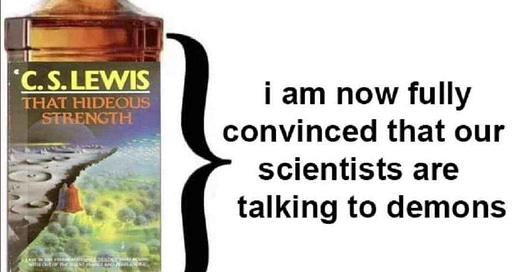Dad,
There’s a meme I love that just shows a handle of Jack Daniels wrapped in the dust jacket of That Hideous Strength, the novel of elite corruption by C.S. Lewis that you mentioned. While you’re drinking from the neck of the bottle, you’re thinking, “well, this book is off to a slow start.” Then you knock back the rest and you think, “I am now fully convinced that our scientists are talking to demons.” Lewis gives such a convincing depiction of how “the science” serves as cover for sanitized progressive tyranny, it could have been written yesterday.
Maybe the story holds up so well after decades because the dynamics Lewis saw at work—the will to power, the little blemishes and compromises that eat their way like cancer through the soul—are eternal. The novel’s title is taken from Sir David Lyndesay’s even more memorably named poem, “Ane Dialog betwixt Experience and ane Courtier off the Miserabyll Estait of the Warld.” Rolls off the tongue.
Apparently the warld’s estait has always been pretty dang miserabyll, since the poem is from the 16th century and the line in question refers back to no less primordial an episode than the building of the Tower of Babel: “The shadow of that hideous strength / Six miles and more, it is of length” (I had mercy on our readers and updated the spelling).
Lewis is saying that our modern science-worshipping would-be despots are driven by the same impulse that motivated the builders of Babel. They want to bring the whole world under one system of order and measurement, one perfectly calibrated language of numbers, time, and space that will lock the world into an unchanging order they can control. Some commentators think the Babel story is itself a critique of the ancient Mesopotamian emperors who claimed to be shar kishhati, “King of the World” and its Economic Forum...I mean its four corners. One-world government is about as old as murder, and about as virtuous.
But it’s too easy to pass it all off on a few misguided warlords. Ibn Ezra, one of the greatest Medieval rabbis, speculated that Abraham himself helped build the infamous tower, and that the “one language” spoken in Babel was Hebrew. “Do not be amazed at this,” he wrote. Disastrous as the Babel project may have been, it represents a temptation that resides even in the best of human hearts.
The darkest part of the story isn’t that the builders are doing evil. It’s that they think they’re doing good. After all, wouldn’t it be simpler if we all used one system of measurements, one set of laws, one census register, one language? Simpler, yes—and terrifyingly so. When God listens in on the builders’ plans he frets over what might become of such power in flawed human hands. “This thing they’ve started…now nothing will be beyond them that they come up with to do.” It’s not that virtuous men aren’t fit to rule the world. It’s that there are no virtuous men.
Love,
Spencer






In “God In The Dock,” Lewis also said this, which walks astride your comments on Babel perfectly.
“Of all tyrannies, a tyranny sincerely exercised for the good of its victims may be the most oppressive. It would be better to live under robber barons than under omnipotent moral busybodies. The robber baron's cruelty may sometimes sleep, his cupidity may at some point be satiated; but those who torment us for our own good will torment us without end for they do so with the approval of their own conscience. They may be more likely to go to Heaven yet at the same time likelier to make a Hell of earth.”
"The darkest part of the story isn’t that the builders are doing evil. It’s that they think they’re doing good."
We humans are Very good at any number of things. Right At The Top Of The List has to be Rationalization.